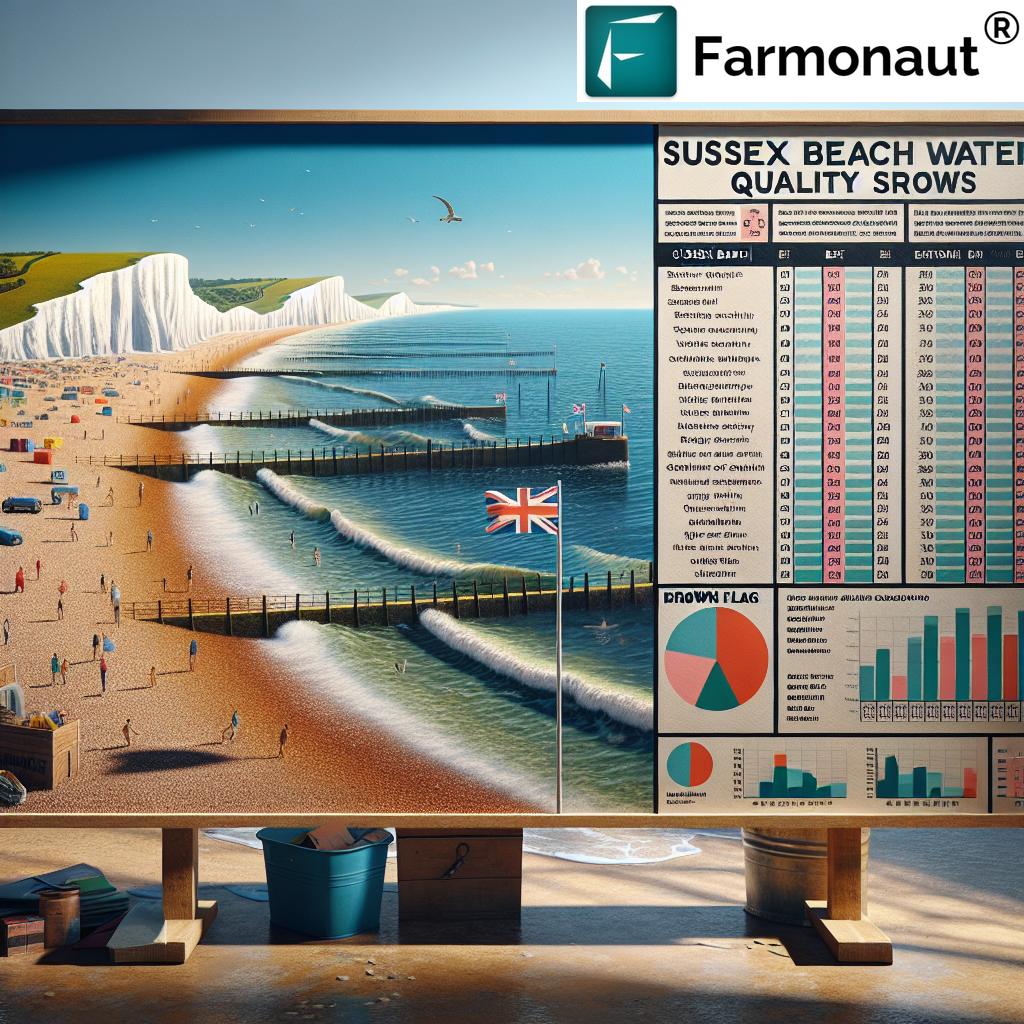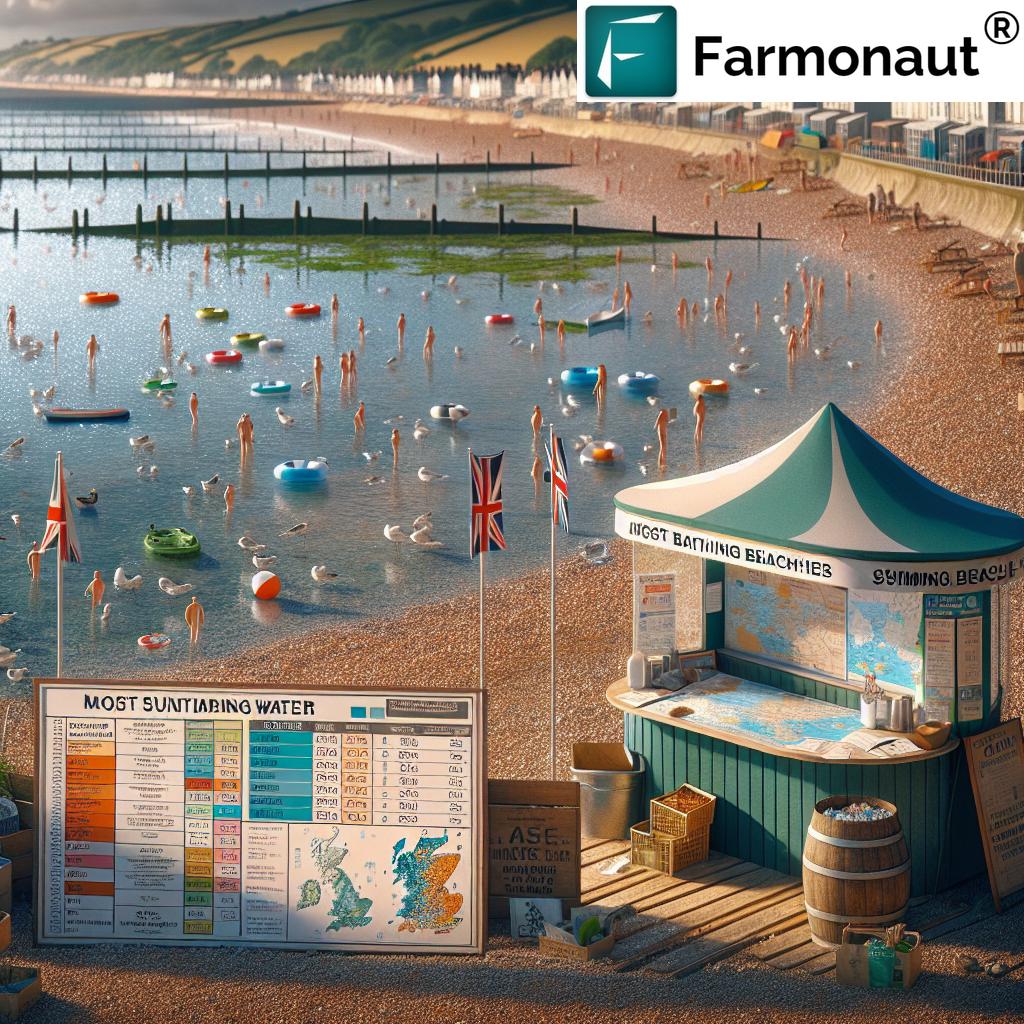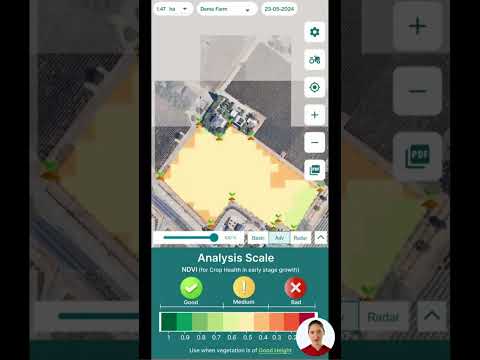Sussex Beach Water Quality 2024: Shocking Brown Flag Winners Revealed
“In 2024, over 15 Sussex beaches received Brown Flag Awards for poor water quality, highlighting urgent environmental concerns.”
Table of Contents
- Sussex Beach Water Quality: 2024 Overview
- Brown Flag Awards Beaches: What Are They?
- Analysing the England Beach Cleanliness League Table 2024
- Bacteria Levels in UK Bathing Waters: How Ratings Are Determined
- Sussex’s 2024 Brown Flag Beaches: Spotlight on Worthing & Aldwick
- Best and Worst UK Beaches 2024: Cleanest and Dirtiest Coastlines
- England Beach Cleanliness League Table 2024
- Summer Swimming Safety: Advice for UK Beachgoers
- How Technology like Farmonaut Advances Environmental Health
- FAQ – Sussex Beach Water Quality & Brown Flag Awards
- Conclusion: Research, Act, and Swim Safely This Summer
Sussex Beach Water Quality: 2024 Overview
When we think of Sussex, we picture rolling downs, famous piers, and golden stretches of coastline perfect for a summer holiday. However, for swimmers and families, knowing the true state of Sussex beach water quality in 2024 has never been more important. The water quality at our favorite UK coastlines is facing increased scrutiny, especially with the latest data from the Environment Agency (EA) highlighting both the cleanest beaches and those with flagged concerns.
This year, our coastal county has faced shocks as it tumbled to 13th place in the England beach cleanliness league table, with Sussex’s reputation as a clean and safe place for sea bathing now under the spotlight. The Brown Flag Awards beaches announced in the 2024 list brought unwanted attention to areas in Worthing and Aldwick, raising questions about sewage pollution on UK coastlines, bacteria levels in our bathing waters, and the security of summer swimming plans.
We will break down which Sussex beaches are now considered risky, which remain shining examples of cleanliness, and how advanced data analysis (including over 7,000 EA water samples) and new technology are guiding us toward better environmental stewardship.
Brown Flag Awards Beaches: What Are They?
The infamous Brown Flag Awards beaches have become a central talking point for beach lovers and environmentalists alike. These awards, curated by the independent travel site Holiday Park Guru, are given to beaches with the poorest water quality ratings across England.
- The Brown Flags are not badges of honor. Instead, they signify a beach where official data points to elevated bacteria – especially dangerous levels of intestinal enterococci and e-coli.
- Sewage, agricultural runoff, and urban waste are the typical causes for the “poor” rating.
- Brown Flag Award status is determined using the EA’s own four-tier bathing water score:
- Three stars = Excellent
- Two stars = Good
- One star = Sufficient
- Zero stars = Poor (Brown Flag)
- This year, the number of Brown Flag beaches in England increased by 46%, with 19 locations named in 2025 up from 13 the previous year.
We need to ask ourselves: what went wrong, and what can be done to reverse this trend?
Analysing the England Beach Cleanliness League Table 2024
The England beach cleanliness league table is the definitive ranking for counties and beaches, determined by the number of three stars (excellent) and Brown Flag Awards beaches. According to the Holiday Park Guru data, the best and worst UK beaches in 2024 are clearly mapped, allowing us to make more informed decisions this summer.
- Sussex slipped to 13th place among counties for proportion of clean/bathing water excellence.
- Counties like Northumberland, Dorset, and Devon dominate the top, with close to 90% of their beaches rated as excellent.
- Meanwhile, Lancashire remains at the bottom: none of its coastlines have been rated as excellent.
The summertime water quality data can be a life-saving tool for swimmers, and analysing county scores gives us a clearer vision of where investments and improvements are most needed.
Bacteria Levels in UK Bathing Waters: How Ratings Are Determined
The science behind bathing water ratings UK is rigorous. The Environment Agency takes water samples from around 400 designated beaches, focusing on the peak season from 15th May to 30th September. Each sample is tested for two critical bacteria indicators:
- Intestinal Enterococci
- Escherichia coli (E. coli)
Excessive levels of these bacteria signal recent contamination, primarily from sewage pollution on UK coastlines but also agricultural, livestock, wildlife, bird activity, and road runoff.
- Each location receives a rating: three stars (excellent), two stars (good), one star (sufficient), or zero stars (poor).
- Recent data shows 67% of England’s monitored resorts achieved a three stars rating, while 5% scored zero stars—an increase from last year.
- The government’s calculations draw on samples from at least the last four years, smoothing out anomalies and providing us a robust long-term view.
Sussex’s 2024 Brown Flag Beaches: Spotlight on Worthing & Aldwick
Few headlines have been as jarring as those about Worthing Beach House and Aldwick Beach at Bognor Regis—both named among the Brown Flag Awards beaches for Sussex in 2024.
- Worthing Beach House (East) — This “newcomer” area, listed for official water testing in 2024, was given a poor (zero star) rating. Swimmers and families should be cautious when considering a dip at this location this summer.
- Aldwick Beach at Bognor Regis — Returning to the Brown Flag list, Aldwick again faces critical attention for contaminants linked to sewage and run-off.
Nearby, two additional Sussex water quality testing locations—Worthing (central) and Goring Beach—also fared poorly, achieving only one star. These narrowly missed Brown Flag status, but still pose concerns.
Encouragingly, nearly half (47%) of Sussex’s beaches remain rated “excellent,” though three notable locations (Lancing Beach Green, Worthing east of Goring, and Bognor Regis East) saw their water quality scores drop from last year.
Amid this, the rise in bacteria levels in UK bathing waters linked to rainfall, overflow events, and ongoing environmental neglect remains a primary concern for local campaigners, swimmers, and holidaymakers alike.
“England’s beach cleanliness league table ranks over 400 coastlines, revealing the safest and riskiest spots for swimmers.”
Brown Flag Awards and Their Impact on Sussex’s Standing
- Sussex’s number of Brown Flags doubled this year: from one in 2023 to two in 2024.
- Out of 400+ bathing waters across England, 19 beaches received the Brown Flag in 2024.
- Campaigners are using these awards to spur protest and action, with Somerset taking up the “generous” offer from Holiday Park Guru to fly an actual Brown Flag, decorated with a now-infamous poo emoji, at its worst beach.
- The spike in flagged beaches, particularly in southeast counties like Sussex, underscores ongoing sewage pollution on UK coastlines—an issue amplified during the rainy season when overflow is most likely.
England Beach Cleanliness League Table 2024
Below, we present a comparison table of sampled beaches across Sussex and key locations in England, their authority, ratings, and Brown Flag statuses. This league table offers a clear, sortable reference for planning summer swimming or seaside holidays and helps identify the cleanest beaches in Sussex!
| Beach Name | Local Authority | Estimated Water Quality Rating | Brown Flag Status | Est. Swimmable Days in 2024 | Additional Notes |
|---|---|---|---|---|---|
| Worthing Beach House (East) | Worthing Borough | Poor (Zero Stars) | Winner | <15 | Newcomer; designated EA area |
| Aldwick Beach, Bognor Regis | Arun District | Poor (Zero Stars) | Winner | <20 | Repeat Brown Flag |
| Goring Beach | Worthing Borough | Sufficient (One Star) | Not Winner | ~30 | Near Brown Flag threshold |
| Worthing (Central) | Worthing Borough | Sufficient (One Star) | Not Winner | ~30 | Drop from last year |
| Bognor Regis (East) | Arun District | Good (Two Stars) | Not Winner | ~60 | Slight decline 2023-24 |
| Lancing (Beach Green) | Adur District | Good (Two Stars) | Not Winner | ~65 | Quality dropped |
| Hastings Pelham Beach | Hastings Borough | Excellent (Three Stars) | Not Winner | >80 | Upgraded from Good |
| West Wittering | Chichester District | Excellent (Three Stars) | Not Winner | >85 | Proximity to nature reserve |
| Blackpool Pleasure Beach | Blackpool Council | Poor (Zero Stars) | Winner | <25 | High-profile Brown Flag |
| Weston-super-Mare (Main) | North Somerset | Poor (Zero Stars) | Winner | <22 | Brown Flag activism site |
| Northumberland – Bamburgh | Northumberland | Excellent (Three Stars) | Not Winner | >90 | High rating county-wide |
| Dorset – Swanage | Dorset | Excellent (Three Stars) | Not Winner | ~92 | Award-winning coastlines |
| Devon – Woolacombe | Devon | Excellent (Three Stars) | Not Winner | ~91 | Blue Flag adjacent |
| Lancashire – St Annes | Lancashire | Sufficient (One Star) | Not Winner | ~40 | County bottom of league |
Note: Swimmable days are estimates based on EA 2024 data trends and local weather/event impacts. “Winner” denotes listing on the official Brown Flag Awards beaches roster for 2024.
Best and Worst UK Beaches 2024: Cleanest and Dirtiest Coastlines
We all want reassurance about the best and worst UK beaches 2024, especially as summer approaches and plans for family holidays are underway. According to the Holiday Park Guru team (who analysed thousands of EA tests), here’s the clear rundown:
- Northumberland, Dorset, and Devon are the headliners for the cleanest beaches in England. Their excellent rating percentages hover close to 90%.
- In contrast, Lancashire remains at the bottom, with zero three star beaches and far fewer swimmable days.
- Amongst Sussex beaches, nearly 47% of monitored locations received three stars in 2024. This proves the situation isn’t wholly negative!
- Three beaches improved: Hastings Pelham Beach was upgraded from ‘good’ to ‘excellent’, demonstrating that positive change is possible.
- Three beaches declined: Lancing (Beach Green), Worthing (part east of Goring), and Bognor Regis (East) lost ground in ratings this year.
Why Some Sussex Beaches Slip into “Brown Flag” Status
It’s important to understand why some Sussex beach water quality results have failed to meet clean water standards. According to the EA and travel experts:
- Heavy rainfall and storm overflow events cause more untreated sewage to enter coastal waters—especially during autumn and winter, when data is not officially collected.
- Urban development and run-off from roads contribute to increased pollutants and bacteria.
- Agricultural livestock and wildlife have localised impacts, adding to the overall bacteria levels in UK bathing waters.
This aligns strongly with the ongoing national conversation on sewage pollution on UK coastlines and our collective responsibility to push for infrastructure upgrades and better resource management.
Summer Swimming Safety: Advice for UK Beachgoers
With summer swimming safety UK beaches in mind, here are the critical points we must remember:
- Research before you swim: Check the latest beach water quality ratings or the EA’s live bathing water data.
- Avoid swimming after heavy rain: This is when overflow and run-off are likeliest. Waiting 24–48 hours after a big storm reduces bacteria exposure risk.
- Look for signage: Many affected beaches now post warning signs when pollution levels spike. Holiday Park Guru is also offering free brown flags to inform swimmers at Brown Flag locations.
- If in doubt, pick an “excellent” (three stars) beach for the safest swimming experience in Sussex or any UK county.
Our county may have seen an increase in polluted sites this year, but detailed data and public awareness empower us to make better choices.
How Technology like Farmonaut Advances Environmental Health
Environmentally conscious technology plays a pivotal role in fighting the rise of contaminated bathing waters and supporting coastal and agricultural sustainability.
At Farmonaut, we champion this movement by providing satellite-based monitoring, AI-powered advisory, and blockchain traceability for the agriculture industry. While our primary focus is on farms, these same advanced technologies could transform beach and river management by helping authorities track real-time land use changes, predict contamination risks, and optimise wastewater resource management.
-
Satellite-based farm management helps monitor crop health, soil moisture, and can signal when and where run-off may impact water quality—essential for counties where agricultural waste contributes to beach pollution.
Learn more about Farmonaut’s large-scale farm management tools. -
Blockchain-based product traceability provides transparent and immutable records—ensuring food products and agriculture supply chains stay clear of contamination risks and helping meet environmental regulations.
Explore Farmonaut Traceability. -
Fleet management systems reduce unnecessary emissions and resource wastage, benefitting both farms and nearby river/coastal environments by minimising accidental waste discharge.
Check Farmonaut Fleet Management. -
Carbon footprinting tools support agribusinesses and regulators in reducing their climate impact, mitigating downstream risk to sensitive aquatic environments.
Discover Farmonaut Carbon Footprinting. -
Our API platform allows seamless integration of satellite and weather data for broader monitoring needs.
Access Farmonaut’s API: API Platform | API Developer Docs
Our end goal is to help make sustainable management accessible to everyone, so that the cleanest beaches in Sussex and the UK can be preserved for years to come.
Farmonaut Subscription Plans
Choose the right tools for sustainable agriculture management, environmental monitoring, and data-driven insights.
FAQ – Sussex Beach Water Quality & Brown Flag Awards
What are the Brown Flag Awards beaches?
The Brown Flag Awards beaches are named and shamed annually for having the poorest water quality ratings according to Environment Agency data. Receiving a Brown Flag means a beach has failed bathing water tests due to high levels of sewage-related bacteria.
How is Sussex performing compared to other counties?
Sussex slipped to 13th in the England beach cleanliness league table, largely due to increases in beaches with poor water quality and higher bacteria counts. Other counties like Northumberland, Dorset, and Devon rank top.
What causes poor bathing water ratings in the UK?
Poor ratings usually result from sewage overflow, agricultural run-off, urban waste, and heavy rainfall which can all increase bacteria in bathing waters.
Which Sussex beaches received the Brown Flag in 2024?
Worthing Beach House (East) and Aldwick Beach at Bognor Regis were officially listed as Brown Flag Awards beaches. Worthing and Goring Beach also performed badly, scoring only one star.
Is it safe to swim in Sussex during summer 2024?
Nearly half of Sussex’s monitored beaches are rated excellent, offering safe swimming during the summer. Always check current ratings and beware after heavy rainfall.
Can technology like Farmonaut help with water quality?
Advanced monitoring and data platforms such as Farmonaut provide tools for tracking environmental parameters, predicting risk events, and supporting sustainable management, especially where agriculture impacts coastal health.
How do I check real-time bathing water ratings in the UK?
Refer to the Environment Agency’s official site or independent resources like Holiday Park Guru for up-to-date bathing water ratings UK and clean/dirty beach lists.
Conclusion: Research, Act, and Swim Safely This Summer
The Sussex beach water quality headlines in 2024 remind us all that coastal health is never guaranteed—and that our precious beaches deserve both celebration and advocacy. While Brown Flag Awards beaches at Worthing and Aldwick raise alarm, the fact that nearly half our beaches still earn three stars for water cleanliness proves that conscious management and public engagement make a difference.
- Plan your trip using science: consult tables and real-time scores to pick the safest spots this summer.
- Speak out for upgrades to local sewage and waste infrastructure, protecting our swimming heritage for generations.
- Leverage the latest technology for sustainability—whether you’re a holidaymaker, coastal resident, or involved in environmental protection.
By staying informed, acting locally, and demanding high standards for our water, we can help restore Sussex—and every UK coastline—to the pristine standard every swimmer deserves. Remember: do your research this summer, and your seaside memories will be “wish you were here,” not “wish I’d worn a hazmat suit.”
Stay safe, stay informed — and enjoy Sussex’s coasts responsibly!






















